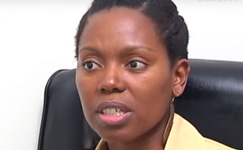South African women in film honoured
12 August 2015
It is important that women tell their story, South African actress Xolile
Tshabalala said at an event that honoured women in film and fashion.
Tshabalala and other actresses, such as Terry Pheto, were among the guests
invited to the function yesterday by Minister Susan Shabangu of the national
Department of Women. Speaking at the launch of Women's Month on 30 July in
Pretoria, Shabangu said that weekly events would be held to celebrate South
African women.
Week one would celebrate women in fashion; week two would examine women
in the film industry; week three would focus on the trafficking of women and
children and the exploitation of women; week four would be concerned with
women's economic empowerment.
The theme of Women's Month this year is "Women united in moving South
Africa forward". The month runs every August, with Women's Day an annual
national public holiday on 9 August. The day marks the Women's March against
apartheid laws, specifically against the law requiring all black women to carry pass
books, which took place on 9 August 1956.
Yesterday's gathering was updated on social media, with @Dept_of_Women
tweeting that Tshabalala said it was vital she told her story. "Nothing gets told
about women who were affected by the struggle, but men's stories are
everywhere."
She also said that woman could not always be supporting actresses of male
actors.
Sibongile Mkhabela
Shabangu took the time to acknowledge Sibongile Mkhabela, the only girl
arrested during the 16 June 1976 student uprising in Soweto. Mkhabela was an
executive member of the Soweto Students Representative Council and general
secretary of the South African Students Movement.
Speaking to Play Your Part, Mkhabela described that day: "I remember when
we were marching, we were coming from Naledi, that was my high school, and it's
further down in the west, and Hector Pieterson
died, I think, more to the south.
"And as we were marching we got the message that Hector Pieterson had died.
For me that was a defining moment, if there were defining moments, and that
sense of loss… just never left me," she said.
About the event, Shabangu said she was honouring the two industries of film
and fashion because she felt they had been neglected.
Women in the boardroom
Meanwhile, at a separate event to mark Women's Month, African Development
Bank's special envoy on gender, Geraldine Fraser-Moleketi, a South African and
former politician, took part as a speaker in the WeLead Women's Leadership Mini-
Conference on 7 August in Johannesburg. The theme was: "We Are the Leaders
We've Been Waiting For."
According to the bank, the conference gathered high-profile speakers to
address women's leadership in technology in Africa.
Fraser-Moleketi shared findings from the African Development Bank report
Where are the Women:
Inclusive boardrooms in Africa’s top-listed
companies. She urged the tech industry to promote more female board
directors in order to increase competitiveness and to contribute to inclusive growth
in Africa.
"We need more women in boardrooms to enhance the competitiveness of the
continent," she said. "Africa will not achieve its economic transformation
successfully without the full integration of women, from the smallest companies to
the top-listed ones.
"Diverse boards make more efficient companies, a range of recent research
and data state it overtly. The research outlined shows that the transformation is
starting to happen."
Transformation is starting
The outlook was positive and Africa was number three at a global level, behind
Europe and America, she added.
"But almost 33% of African listed companies have no women sitting on their
boards. Nonetheless, this creates an incredible opportunity for the tech industry as
it is
a fast-growing sector, particularly in Africa. In the report the telecoms listed
companies have 9% women board directors, almost one for each of the 10
companies surveyed," said Fraser-Moleketi.
"South Africa, number two in the report, has an elaborate suite of efficient
government policies clearly promoting equality and diversity. For example, quotas
for state-owned companies. But it might not be enough."
Source: SAinfo reporter
 According to actress Xolile Tshabalala, women cannot always be the supporting actors to men. (Image: SABC Digital News via YouTube)
According to actress Xolile Tshabalala, women cannot always be the supporting actors to men. (Image: SABC Digital News via YouTube)




